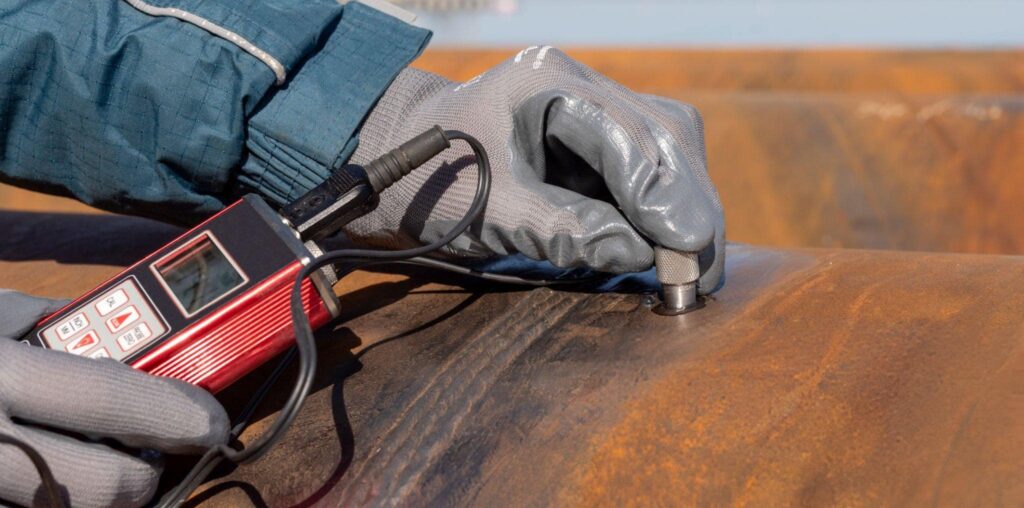Ultrasonic thickness gauges are essential tools used in industries that require precise measurements of material thickness. These non-destructive devices are designed to provide accurate results without compromising the integrity of the material. In this guide, we explore what ultrasonic thickness gauges are, their applications, factors that influence their cost, and how to use them effectively. We will also take a closer look at Cygnus Instruments, a leading manufacturer of ultrasonic thickness gauges.
What is an Ultrasonic Thickness Gauge?
An ultrasonic thickness gauge is a device that measures the thickness of a material by emitting high-frequency sound waves into it. When the waves encounter a boundary (such as the opposite side of the material), they reflect back, and the gauge calculates the thickness based on the time it takes for the waves to return. This technique is particularly useful for materials such as metals, ceramics, plastics, and composites. It is especially beneficial in situations where physical access is limited, or damaging the surface is not an option.
Applications of Ultrasonic Thickness Gauges
Ultrasonic thickness gauges are used in many industries to ensure product quality and safety. Some of the key applications include:
- Manufacturing: Verifying material specifications to ensure components meet quality standards.
- Marine and Shipping: Monitoring the thickness of ship hulls and underwater structures to prevent corrosion-related failures.
- Oil and Gas: Inspecting pipelines and storage tanks for thinning or corrosion, which could lead to leaks or ruptures.
- Aerospace: Ensuring aircraft components maintain the required thickness to guarantee safe operation.
- Automotive: Measuring the thickness of brake discs, engine parts, and other critical components to ensure proper performance.
These gauges are vital for maintaining operational safety, especially in industries where precise measurements are essential for regulatory compliance and performance.
Ultrasonic Thickness Gauge Cost
The cost of ultrasonic thickness gauges can vary significantly based on the features, brand, and intended use. Entry-level models generally cost between £300 and £500 and are suited for basic applications. On the other hand, advanced models equipped with features such as multiple-echo technology, data logging, and wireless connectivity can range from £1,500 to £5,000 or more.
Key factors influencing the cost include:
- Measurement Range: Gauges with broader ranges tend to cost more.
- Accuracy and Resolution: Higher precision comes at a premium.
- Durability: Models built for rugged environments or underwater use are generally more expensive.
- Additional Features: Advanced capabilities such as Bluetooth connectivity and cloud data storage add to the cost.
- Brand and Support: Manufacturers like Cygnus Instruments offer reliable products with excellent customer support, which contributes to the overall value.
Choosing the right ultrasonic thickness gauge requires balancing cost with functionality to meet the specific needs of your operations.
How to Use an Ultrasonic Thickness Gauge
Using an ultrasonic thickness gauge correctly is essential for obtaining accurate measurements. Follow these steps to ensure reliable results:
- Prepare the Surface:
Clean the surface to remove rust, dirt, or coatings that could interfere with the sound waves. A couplant, such as gel or oil, is often applied to improve contact between the probe and the surface. - Calibrate the Gauge:
Use a calibration block with a known thickness to ensure the gauge is accurate. Calibration is especially important if you are measuring different types of materials. - Apply the Probe:
Place the transducer probe flat against the material’s surface. If a couplant is used, apply it evenly to avoid air gaps that could affect the reading. - Take the Measurement:
The gauge will display the material thickness, typically in millimetres or inches. Advanced models can provide readings even through coatings, thanks to multi-echo technology. - Store the Data:
Modern gauges, such as those from Cygnus Instruments, come with data logging features, allowing you to store and analyse measurements later. - Verify the Results:
Take multiple readings in different areas to ensure consistency and accuracy, especially if the material shows signs of corrosion or wear.
Proper usage and regular calibration ensure that ultrasonic thickness gauges deliver precise and reliable measurements over time.
Features of Ultrasonic Thickness Gauges from Cygnus Instruments
Cygnus Instruments is a well-known manufacturer of ultrasonic thickness gauges, offering products designed for demanding industrial applications. Some of the standout features of their gauges include:
- Multiple Echo Technology: This technology ensures accurate measurements through coatings, eliminating the need to remove protective layers.
- Rugged Design: Many of their models are built to withstand harsh environments, making them ideal for marine, offshore, and industrial use.
- User-Friendly Interface: Cygnus gauges are designed for ease of use, with intuitive controls and clear displays.
- Advanced Connectivity: Some models feature Bluetooth and USB connectivity, enabling users to transfer data easily for further analysis.
- Comprehensive Support: Cygnus Instruments provides excellent after-sales support, including calibration services and technical assistance.
Choosing a product from Cygnus Instruments ensures high-quality performance and reliability for even the most challenging applications.
How to Choose the Right Ultrasonic Thickness Gauge
Selecting the right ultrasonic thickness gauge depends on several factors:
- Application Requirements: Identify whether you need a basic gauge or one with advanced features like multiple-echo technology and data logging.
- Operating Environment: Choose a gauge that is suitable for the conditions in which it will be used. Some models are designed for underwater or high-temperature environments.
- Budget: While basic models are more affordable, investing in an advanced gauge may offer better long-term value.
- Brand Reputation: Opt for a reputable brand like Cygnus Instruments to ensure reliability and excellent customer support.
Taking the time to choose the right gauge will help you achieve more accurate results and improve operational efficiency.
Conclusion
Ultrasonic thickness gauges are indispensable tools for industries that require precise and non-invasive measurements. The cost of ultrasonic thickness gauges varies depending on the features and capabilities required. Understanding how to use these gauges correctly ensures reliable results, while investing in a high-quality model, such as those from Cygnus Instruments, guarantees long-term value.
With the right ultrasonic thickness gauge in hand, you can improve safety, efficiency, and compliance in your operations, ensuring that your equipment and materials remain in optimal condition.




